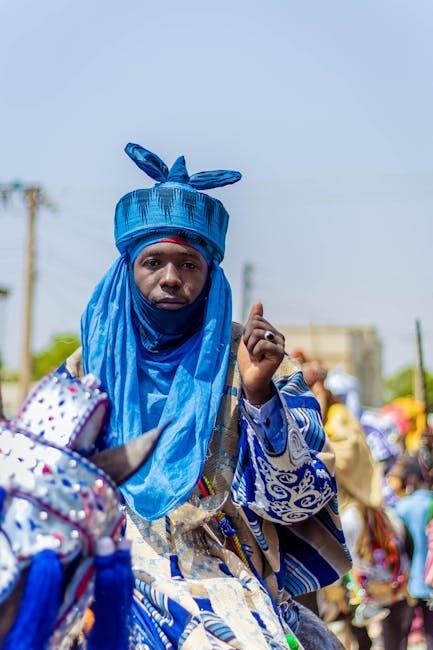Wole Soyinka’s play explores the tragic story of Elesin Oba, the king’s horseman, in colonial Nigeria, delving into themes of duty, cultural identity, and colonial disruption.
1.1 Background and Historical Context
The play is set in Oyo, Nigeria, during World War II, under British colonial rule. It draws from a real incident in 1946, where the king’s horseman, Elesin Oba, faced colonial interference in his ritual suicide. The story reflects the tension between Yoruba traditions and British colonial authority, highlighting the cultural and political conflicts of the time. The historical context underscores the disruption of indigenous practices by colonial powers, emphasizing the struggle to maintain cultural identity amidst external domination; This backdrop provides a rich tapestry for exploring themes of duty, tradition, and the clash of civilizations in a colonized society.
1.2 The Play’s Relevance in Modern Literature
Death and the King’s Horseman remains a cornerstone of modern literature, offering timeless insights into cultural identity, colonialism, and the human condition. Its exploration of tradition versus modernity resonates universally, making it a vital text in postcolonial studies; Soyinka’s poetic language and blend of Yoruba traditions with contemporary themes ensure its relevance across generations. The play’s universal themes of duty, honor, and the clash of cultures continue to captivate global audiences, solidifying its place in world literature. Its adaptation into various forms, including film, further underscores its enduring appeal and significance in modern cultural discourse.
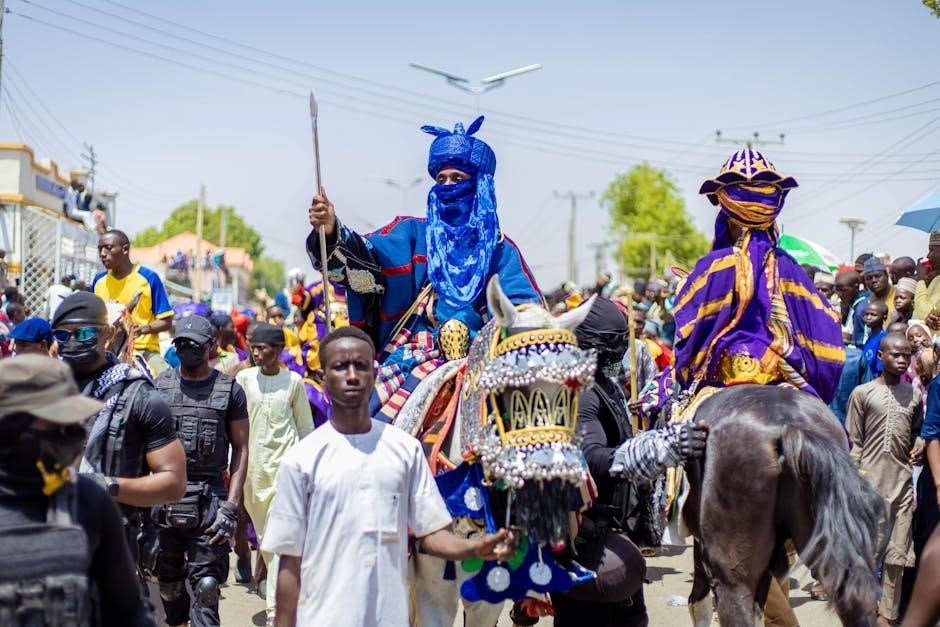
Plot Summary of “Death and the King’s Horseman”
The play unfolds in 1943 Nigeria, focusing on Elesin Oba, the king’s horseman, who must ritually die to accompany his late king. However, his hesitation and colonial officer Simon Pilkings’ intervention disrupt this sacred duty, leading to tragic consequences.
2.1 The Opening Scene: Elesin Oba in the Marketplace
The play begins in a bustling Yoruba marketplace, where Elesin Oba, the king’s horseman, prepares to fulfill his sacred duty. A month after the king’s death, Elesin must ritually follow him into the afterlife. The scene captures the vibrant atmosphere of the market, with women, merchants, and drummers creating a lively backdrop. Elesin, accompanied by his praise-singer, expresses his eagerness to embrace death, yet he indulges in the joy of the moment, surrounded by the women who adorn him in fine clothes. This duality of duty and desire sets the tone for the conflict that unfolds, as Elesin’s resolve is tested by both internal and external forces.
2.2 The Confrontation with Colonial Officer Simon Pilkings
The confrontation between Elesin Oba and Simon Pilkings marks a turning point in the play, highlighting the clash between tradition and colonial authority. Pilkings, the British colonial officer, intervenes to prevent Elesin’s ritual suicide, driven by his own moral and cultural biases. Elesin, deeply committed to his duty, views Pilkings’ interference as a violation of sacred traditions. The tension escalates as Pilkings, unaware of the cultural significance of Elesin’s act, imprisons him, disrupting the ritual and causing chaos. This confrontation underscores the profound misunderstanding between the Yoruba people and their colonial rulers, while also revealing Elesin’s internal struggle between duty and desire.
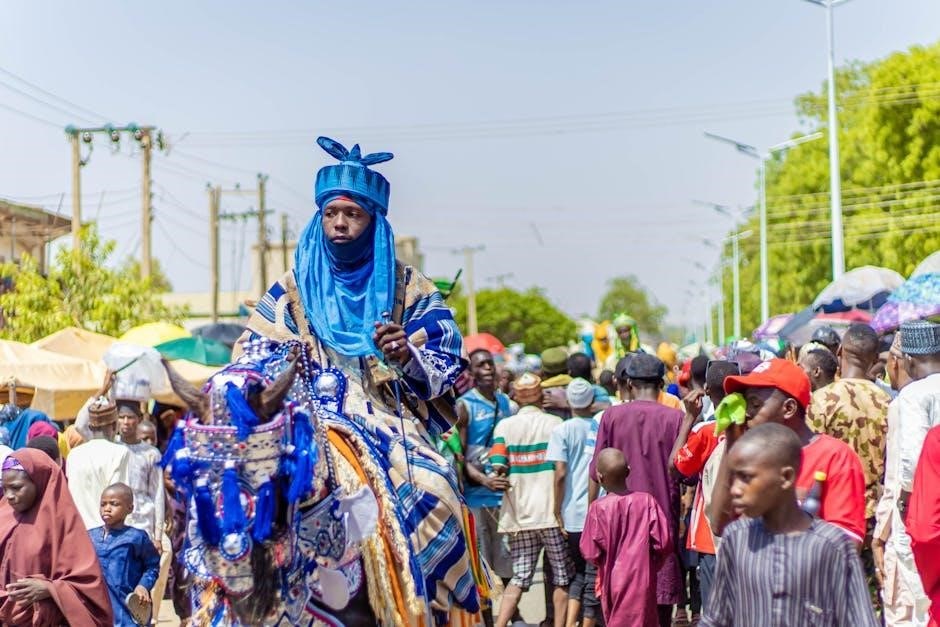
Themes and Symbolism in the Play
Central themes include duty, cultural identity, and the clash between tradition and modernity, with death symbolizing transition and the struggle to preserve cultural integrity amidst colonial influence.
3.1 The Theme of Duty and Ritual Suicide
The play centers on Elesin Oba’s sacred duty to commit ritual suicide, ensuring the king’s safe passage to the afterlife. This act, deeply rooted in Yoruba tradition, symbolizes honor and loyalty. Elesin’s internal struggle highlights the tension between personal desire and communal obligation. His eventual hesitation, influenced by colonial interference, underscores the disruption of cultural practices by external forces. Ritual suicide here represents not just individual sacrifice but the preservation of cosmic order, reflecting the Yoruba belief in the interconnectedness of life and death. The theme explores the moral and cultural complexities of adhering to tradition in the face of modernity and colonialism.
3.2 Cultural Clash Between Yoruba Tradition and British Colonialism
The play vividly portrays the clash between Yoruba traditions and British colonialism, particularly through Elesin’s ritual suicide and Simon Pilkings’ intervention. The Yoruba belief in the necessity of Elesin’s death to maintain cosmic balance is met with disdain by the colonial officer, who views it as barbaric. This conflict symbolizes the broader struggle between indigenous practices and imposed Western values. The British authorities’ disregard for Yoruba customs highlights the destructive impact of colonialism on native cultures, while Elesin’s internal conflict reflects the individual’s struggle to uphold tradition in a rapidly changing world dominated by foreign rule.
3.3 The Symbolism of Death and the Afterlife
Death in the play symbolizes a sacred transition, bridging life and the afterlife in Yoruba cosmology. Elesin’s ritual suicide is not an end but a duty to guide the king into the afterlife, ensuring cosmic balance. The afterlife, a realm of ancestors, embodies continuity and tradition. Elesin’s failure to complete the ritual disrupts this harmony, highlighting the consequences of cultural disruption. Death, thus, is both a personal and communal obligation, reflecting the Yoruba belief in the interconnectedness of life, death, and the spiritual world. This symbolism underscores the play’s exploration of cultural identity and the sacredness of tradition in the face of colonial interference.
Character Analysis
The play centers on Elesin Oba, the king’s horseman, and Simon Pilkings, the colonial officer, exploring their conflicting duties and cultural perspectives amid colonial rule.
4.1 Elesin Oba: The King’s Horseman
Elesin Oba, the king’s horseman, is a complex figure torn between tradition and personal desire. He is destined to commit ritual suicide to guide the deceased king to the afterlife, a duty rooted in Yoruba custom. Elesin’s internal conflict arises as he delayed his death to savor life’s pleasures, revealing his human frailty. His failure to fulfill his duty disrupts the cosmic order, highlighting the tension between individual will and communal expectations. Through his character, Soyinka portrays the struggle to uphold cultural rituals in the face of colonial interference and personal weakness, making Elesin a tragic yet deeply relatable figure.
4.2 Simon Pilkings: The Colonial Officer
Simon Pilkings, the colonial officer, represents the oppressive force of British colonialism in Nigeria; He is determined to prevent Elesin Oba from committing ritual suicide, viewing it as barbaric and incompatible with “civilized” values. Pilkings’ actions are driven by a mix of cultural arrogance and a misguided belief in his moral superiority. His intervention disrupts the traditional Yoruba rites, highlighting the clash between colonial authority and indigenous customs. Through Pilkings, Soyinka critiques the colonial mindset that disrespects local traditions, portraying him as a symbol of cultural insensitivity and the oppressive nature of colonial rule.
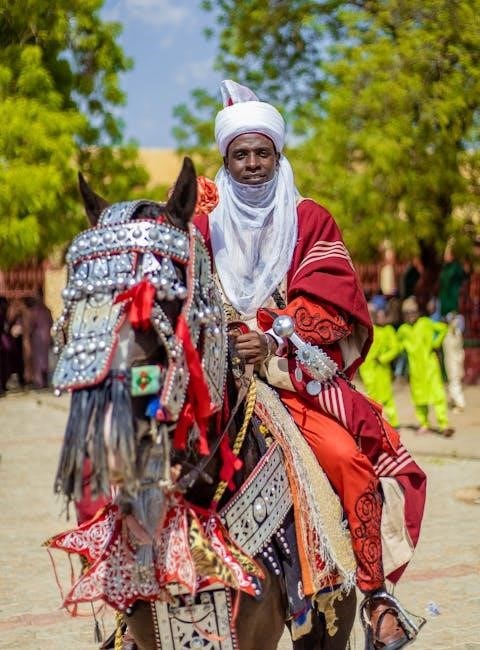
The Conflict Between Tradition and Modernity
The play highlights the tension between Yoruba traditions and British colonial modernity, as Elesin’s ritual duty clashes with Pilkings’ efforts to impose external values and control.
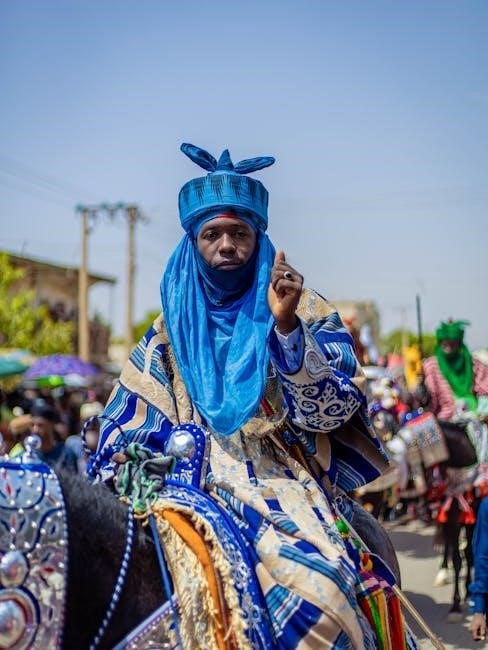
5.1 The Importance of Ritual in Yoruba Culture
In Yoruba culture, rituals like Elesin’s suicide are essential for maintaining cosmic balance and communal harmony. They symbolize the continuation of life and the afterlife, ensuring spiritual and societal stability.
5.2 The Impact of Colonialism on Indigenous Practices
Colonialism disrupted Yoruba traditions, as seen in Simon Pilkings’ interference with Elesin’s ritual suicide. British authorities, misunderstanding the cultural significance, sought to suppress such practices, viewing them as primitive. This clash highlighted the deep disrespect for indigenous customs, leading to a loss of cultural autonomy. The play critique’s colonialism’s erosion of traditional values, emphasizing the spiritual and communal damage caused by external interference. The interruption of Elesin’s duty symbolizes the broader destruction of indigenous practices under colonial rule, underscoring the struggle to preserve cultural identity in the face of oppressive systems. This tension remains a powerful commentary on colonialism’s lasting impact.
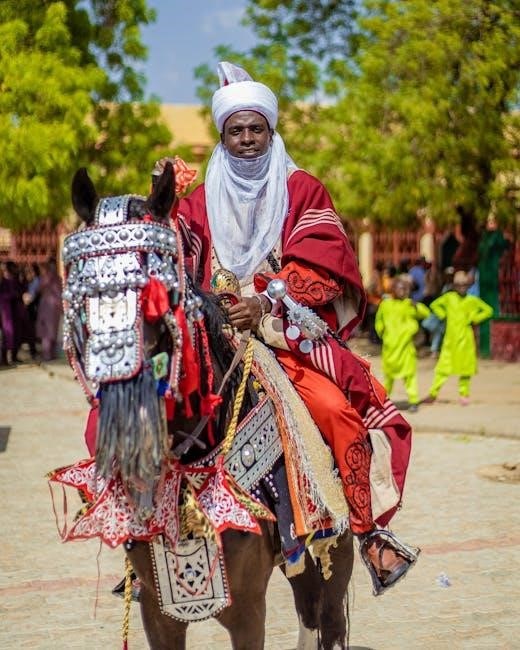
Cultural Significance of the Play
Wole Soyinka’s masterpiece preserves Yoruba traditions, critiquing colonialism’s erosion of cultural identity. It bridges African heritage with global audiences, highlighting the clash between tradition and modernity, and the consequences of colonial interference, making it a landmark in African literature.
6.1 The Yoruba Tradition of Ritual Suicide
The Yoruba tradition of ritual suicide, central to the play, reflects the belief in a communal cycle of life and death. Elesin Oba, as the king’s horseman, is obligated to follow his deceased king into the afterlife to maintain cosmic balance. This tradition underscores the Yoruba people’s deep reverence for ancestral customs and the interconnectedness of life and death. The ritual ensures the king’s safe passage and upholds societal harmony, emphasizing duty over personal desire. However, colonial interference disrupts this sacred practice, highlighting the clash between tradition and modernity. The play vividly portrays the cultural significance of this ritual and its importance in preserving Yoruba identity.
6.2 The Play’s Role in Preserving African Cultural Heritage
Wole Soyinka’s Death and the King’s Horseman serves as a vital preservation of Yoruba cultural heritage, showcasing its rich traditions and beliefs. The play highlights the importance of ritual practices, such as the king’s horseman’s duty to follow his monarch into the afterlife, emphasizing the Yoruba worldview. By blending traditional themes with contemporary storytelling, Soyinka not only educates global audiences about Yoruba customs but also challenges colonial narratives that often dismissed African traditions as primitive. The play’s exploration of cultural identity and resilience ensures that Yoruba heritage remains relevant and respected, countering colonial erasure and promoting cross-cultural understanding. It stands as a testament to the enduring strength of African cultural traditions.
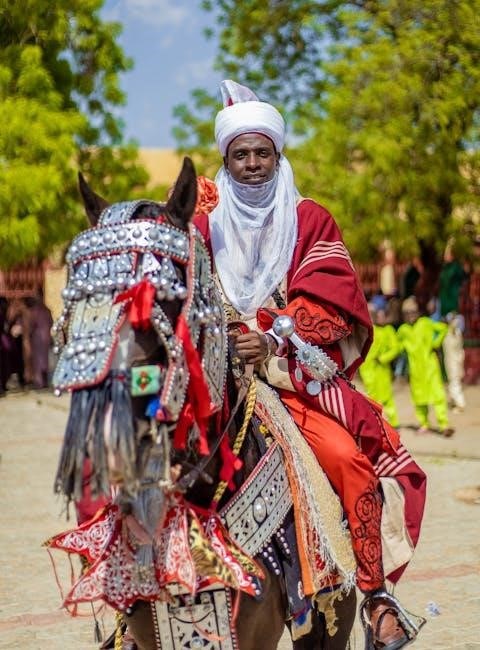
Literary Style and Language
Wole Soyinka’s poetic and evocative language enriches the play, blending Yoruba traditions with modern storytelling to create a vivid exploration of cultural identity and existential themes.
7.1 Wole Soyinka’s Use of Poetic Language
Wole Soyinka employs a rich, poetic language that intertwines Yoruba cultural elements with universal themes. His lyrical prose creates vivid imagery, as seen in Elesin’s dance and the marketplace setting. Soyinka’s use of metaphor and symbolism, such as the forest representing the afterlife, deepens the play’s emotional and spiritual layers. The language not only reflects Elesin’s internal struggle but also highlights the cultural significance of his duty. Soyinka’s poetic style bridges tradition and modernity, making the play a masterpiece of African literature that resonates globally.
7.2 The Blend of Traditional and Contemporary Themes
Wole Soyinka masterfully blends traditional Yoruba beliefs with contemporary colonial realities, creating a rich tapestry of cultural and historical depth. The play seamlessly juxtaposes the sacred rituals of the Yoruba people with the intrusive modernity of British colonialism. Soyinkas use of poetic language and cultural metaphors highlights the tension between timeless traditions and the disruptive forces of modernity. This blend not only preserves the essence of Yoruba heritage but also critiques the colonial imposition that threatens it. By merging the past and present, Soyinka crafts a narrative that is both a tribute to African traditions and a commentary on the universal human struggle between continuity and change.
Wole Soyinkas Death and the Kings Horseman masterfully explores the intricate dynamics of cultural identity and colonial disruption. The play delves into the clash between Yoruba traditions and British colonialism, highlighting the tension between ancient rituals and modern interference. Elesin Obas tragic fate underscores the devastating consequences of cultural misunderstanding and the imposition of foreign values. Through poetic language and rich imagery, Soyinka critiques colonialism while celebrating Yoruba heritage, emphasizing the universal themes of duty, honor, and the struggle to preserve cultural integrity. This play remains a powerful commentary on the enduring impact of colonialism and the resilience of indigenous traditions.
